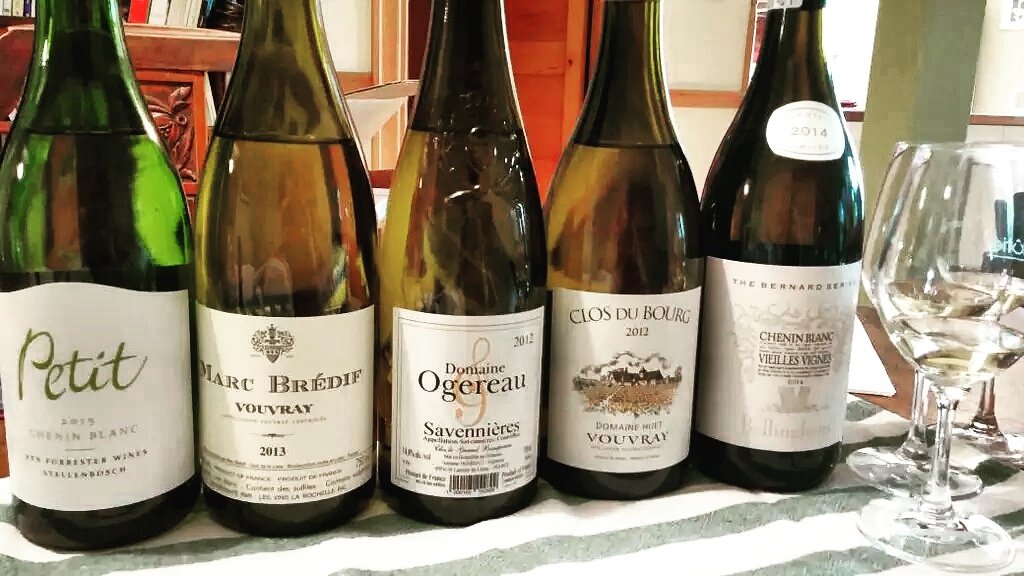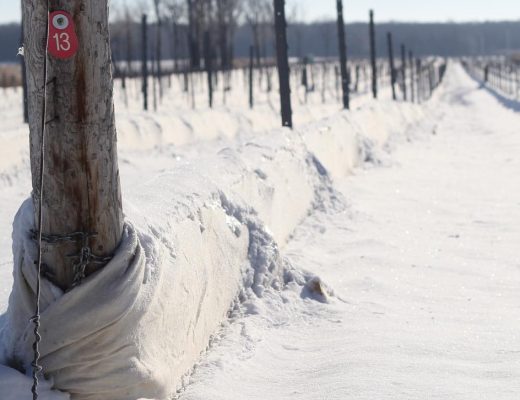Another week, another flight! Next grape up to bat is Chenin Blanc. This incredibly versatile white can be made in a range of styles from sparkling, to still (dry and off-dry), to sweet wines. This week, we are looking at entry level and premium still wines from Chenin’s two strongholds: the Loire Valley and South Africa.
For many years Chenin Blanc has gotten a bad rap outside of its historic home in the Loire Valley. It is a vigorous grape that grows well in many soil types and climates. When over cropped, the wines are insipid and forgettable. In overly hot climates the grapes ripen too quickly leaving insufficient time for much aromatic complexity to develop. This was the case for a long time in South Africa, where the majority of Chenin Blanc was used to add acidity to high volume, bulk blends. Ditto in California, where plantings were highest in the hot Central Valley for jug wine production.
Happily, the days of cheap and cheerful Chenin plonk are fading. More and more growers (those that didn’t pull up their vines to plant more popular varieties) are starting to show Chenin the love…and as our friends in the Loire knew already, when the vine is in balance and optimal maturity is reached at the right pace, the wines are stunning. At its best, Chenin has bright, pure fruit flavours ranging from quince, apple, honey and spice in cool climates to more ripe, tropical and peach notes in warmer areas. The palate is vibrant with bracing acidity, lots of juicy fruit flavours, light to medium body, moderately high alcohol (12°c – 13.5°c) and often a hint of sweet, tangy fruit on the finish.
For dry to off-dry styles of Chenin Blanc from the Loire Valley, Vouvray is king (sparkling through to sweet styles are produced here, but we will look at those at a later date). The vineyard sits atop a plateau on the right bank of the Loire Valley. Dotted through the town are the most incredible, cavernous cellars, carved out of the local white Tuffeau stone (a marine sedimentary rock). The cool, continental climate and diverse soil composition gives wines with racy acidity, intense depth of flavour and lingering minerality. On a visit to see Benjamin Joliveau, viticulturalist with Domaine Huet, I had the pleasure of tasting through a vertical of off-dry and sweet Vouvray dating back to 1985. With age, the acidity mellowed, and notes of dried apricot, honey and baking spice intensified.
Bone dry, brimming with juicy acidity and richly textured, the Savennières vineyard near the town of Angers, gives another expression of high quality Loire Chenin Blanc. Once considered austere and hard-edged in their youth, Savennières wine growers are starting to make more readily approachable styles. The vineyard was made famous by biodynamic wine pioneer Nicolas Joly whose wines from the vineyard plot “Coulée de Serrant” are world renowned.
It is thought that the founder of Cape Town, Jan Van Riebeeck, brought Chenin Blanc cuttings over to South Africa in 1655. The grape, sometimes referred to locally as Steen, is still the most widely planted variety in the country. Dry styles range from light and fruity, to full bodied and oaked. The Coastal Region, Stellenbosch, and the Swartland are just three appellations (called WO, Wine of Origin, in South Africa) that are making noise internationally with their interpretations of Chenin Blanc. The secret to great South African Chenin Blanc, according to my dear friend and South African wine guru Pascal Schildt, is the high volume of old vines that produce rich, concentrated flavour.
For the purposes of this initial overview tasting, I chose classic examples from the following producers (What do VW, PW & LW mean? Click on my scoring system for the answer):
Ken Forrester “Petit” Chenin Blanc 2015 (Western Cape) – 87pts. VW
Ken Forrester is a highly respected Chenin Blanc producer from Stellenbosch. This everyday white is pale golden in colour with green hues. Ripe melon, guava and candied peach notes dominate the nose. Dry, light bodied and fresh with a subtle effervescence, and a fruity finish. Simple, but well-made and easy drinking, representing decent value.
Where to Buy: SAQ (14.85$)
Marc Brédif Vouvray 2013 – 89pts. PW
Restrained notes of red apple, quince, baking spices and subtle floral aromas. Bracing acidity leads into a juicy, medium weight core and a lifted, ripe apple finish. A well-balanced, linear wine that is drinking well now but shows little potential for further development.
Where to Buy: SAQ (20.45$)
Domaine Ogereau “Clos le Grand Beaupréau” Savennières 2012 – 93pts. PW
The Ogereau family refer to themselves as “vine gardeners” referring to the loving care lavished on each individual vine in their 20 hectare holdings. This heady, enticing white shows ginger, honey, quince jelly and baked apple on the nose. The bright, zesty acidity is balanced by the ample frame, but the alcohol runs a touch hot and a subtle bitterness on the finish stops this wine just shy of perfect.
Where to Buy: SAQ (30.50$)
Domaine Huet “Clos du Bourg” Vouvray sec 2012 – 90Pts. LW
Biodynamic estate, Domaine Huet is one of the leading lights of Vouvray. The Clos du Bourg, one of the domaine’s best vineyards, is reputed for its shallow, stony soils giving intense minerality and generous texture. This dry Chenin has a soft, pretty nose featuring cinnamon, baked apples, honey, quince and mineral notes. Racy acidity, broad, juicy texture and lingering minerality. This was a wet, cool vintage; not the best example of this vineyard’s potential but nonetheless well-made and enjoyable.
Where to Buy: SAQ (43.50$)
Bellingham “The Bernard Series” Old Vine Chenin Blanc 2014 (Coastal Region) – 87pts. PW
The Bellingham estate is one of the oldest in South Africa, dating back to the 1690s. This intensely aromatic white has an oak-rich crème brulée character, with tropical fruit and apricot undertones. Lively and full-bodied, with a broad, creamy texture, and a toasty finish. The heavy handed use of oak and warming alcohol throws off the balance.
Where to Buy: SAQ (25.00$)





1 Comment
Acidity in Wine & Why it Matters - Jacky Blisson
December 3, 2018 at 4:13 pm[…] Attractive notes of yellow fruit are underscored by steely, mineral hints on the nose. Zesty acidity is matched by a taut structure and vibrant, ripe lemon flavours on this light bodied, unoaked Chenin Blanc. Clean and citrussy on the finish. For more on the Chenin Blanc grape, click here. […]